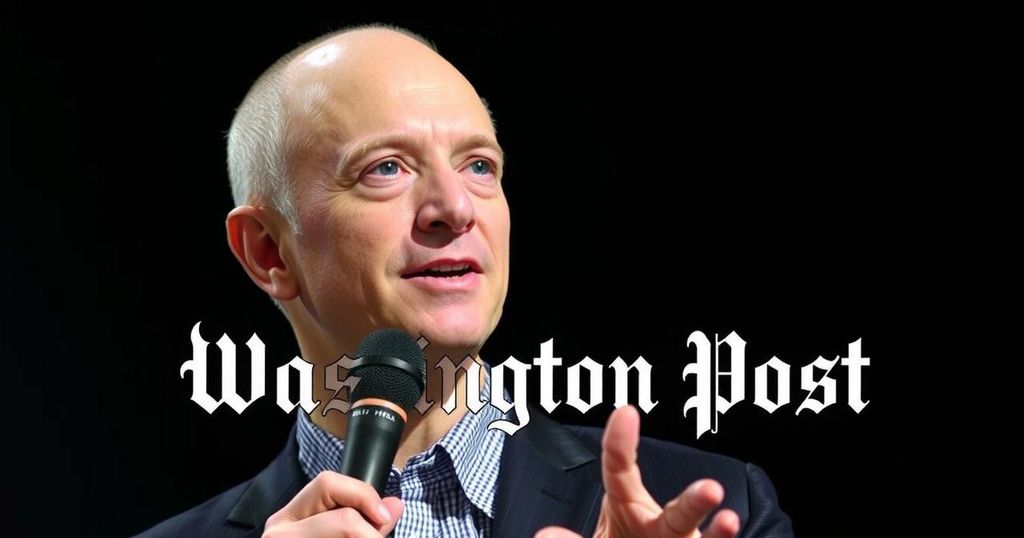Jeff Bezos Defends The Washington Post’s Decision to Discontinue Presidential Endorsements
Jeff Bezos has defended The Washington Post’s decision to end presidential endorsements, citing concerns of perceived media bias. This controversial move has led to nearly 200,000 digital subscriptions being cancelled, mostly in response to an intended endorsement of Kamala Harris. Critics speculate whether the timing was influenced by fears of retaliation from Donald Trump if elected again. The Publisher has reiterated that the newspaper will not endorse any presidential candidates moving forward, a decision that has sparked significant dissent among its journalists.
Jeff Bezos has publicly defended The Washington Post’s decision to discontinue presidential endorsements, a move which has provoked significant backlash, resulting in approximately 200,000 digital subscription cancellations. The decision, made on a Friday and reported by National Public Radio (NPR), was intended to steer clear of any perceived biases, particularly following a planned endorsement of Democratic candidate Kamala Harris. Many subscribers expressed their displeasure, directing their frustrations towards Mr. Bezos, who is well-known as the founder of Amazon and Blue Origin. In his op-ed published on Monday within The Washington Post, Mr. Bezos articulated his belief that such endorsements contribute to a public perception of media bias and non-independence. He remarked, “Presidential endorsements do nothing to tip the scales of an election. What presidential endorsements actually do is create a perception of bias. A perception of non-independence. Ending them is a principled decision, and it is the right one.” Critics have suggested that the timing of this decision, occurring shortly before Election Day, reflects Mr. Bezos’s apprehensions regarding potential repercussions from former President Donald Trump, should he regain office. However, Mr. Bezos insisted that the decision was made independently, without the consultation of any candidates, and asserted that there was “no quid pro quo” involved. He emphasized that there was no relationship between this decision and a meeting between Mr. Trump and senior Blue Origin executives that coincidentally occurred on the same day. William Lewis, the publisher and CEO of The Washington Post, confirmed the newspaper’s position, stating that it would refrain from endorsing any presidential candidates in this or future elections, thus returning to its historical practice of neutrality. The Washington Post has been a prominent figure in American journalism, known for its investigative reporting on pivotal events such as the Pentagon Papers and the Watergate scandal, earning 76 Pulitzer Prizes. This recent decision has sparked a wave of dissent among the newspaper’s journalists, with approximately twenty columnists voicing their concerns and expressing their disappointment in opinion pieces published on the Post’s website. Some even resigned in protest, asserting that the absence of an endorsement represents a disavowal of the fundamental editorial principles that the newspaper has long upheld. Interestingly, this decision followed closely on the heels of the Los Angeles Times’ announcement that it, too, would not endorse a presidential candidate, a decision the California publication acknowledged had a negative impact on its subscriber base.
The Washington Post has a long-standing reputation as a leading newspaper in the United States, recognized for its commitment to high-quality journalism and investigative reporting. Traditionally, media outlets, including The Post, have made endorsements during presidential elections as a way to guide voters. However, in recent years, concerns about media bias and the changing dynamics of public trust in journalism have led some organizations to reconsider this practice. The decision to halt endorsements is significant as it reflects a broader trend in the media landscape, where newspapers are navigating challenges in retaining subscribers and maintaining credibility amidst increasing polarization in political discourse. The reaction from The Post’s journalists further highlights the tension between traditional editorial practices and contemporary expectations from media consumers.
In summary, Jeff Bezos’s defense of The Washington Post’s decision to cease presidential endorsements highlights a strategic shift in journalistic practice aimed at enhancing perceived neutrality. While the decision aligns with an ethos of independence, it has elicited considerable backlash from subscribers and staff alike, raising questions about the balance between editorial autonomy and audience expectations. This development underscores the ongoing challenges facing major news organizations in adapting to a rapidly changing media environment.
Original Source: www.aljazeera.com




Post Comment